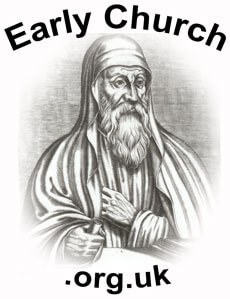Theology on the Web helps over 2.5 million people every year to find high quality theological resources that will help to equip them to serve God and to know Him better (2 Timothy 2:15). Like other websites that provide free services, it is dependent on donations to enable it to grow and develop and only 0.004% of visitors currently do so. If you would like to support this site, please use one of the options to the right of this message.
Synopsis
MINUCIUS FELIX, Marcus, author of the
dialogue Octavius, which, in spite of its lack of originality, and
profound theological intuition, occupies a prominent place among the ancient
apologies of the Latin Church, both on account of its genuine enthusiasm and
elegant form, and on account of the clear and pointed manner in which it
presents and refutes all the various objections to Christianity at that time
circulating among educated Pagans. Of the personal life of the author we only
know that he was a successful lawyer in Rome when he was converted to
Christianity: even the date of his great work is, somewhat doubtful. Formerly
critics generally agreed in placing Minucius between Tertullian and Cyprian.
Certain parts of Octavius seem to be based on Tertullian’s Apologeticus, and certain parts of Cyprian’s De idolorum
vanitate are evidently borrowed from Octavius. Now, as the Apologeticus was written in 207, and the De idolorum vanitate in
247, Octavius must have been written in the first decades of the third
century. In 1762, however, in an epistle Ad Gerhardum Meermann, J. D. Van Hoven drew attention to thc fact that the general state of
Christianity, arid the specific Pagan objections to it, such as represented in Octavius, do not correspond to a period so late as the first decades of
the third century; and, in course of time, more and more scholars
adopted the view that Minucius preceded Tertullian, and wrote his Octavius in the reign of Marcus Aurelius. In 1868, finally, A. Ebert produced almost
conclusive evidence in favor of this view by showing that there exists a direct
relation between Octavius and Cicero’s De natura deorum,
while all the corresponding passages of The Apologeticus seem to have
been derived from Octavius. Of the work of Minucius, there exists only
one manuscript, which was presented by Leo X. to Francis I. It was first
published by Faustus Sabaeus, Rome, 1543, afterwards often; best by Balm, in Corp. Script. EccI. Lat., ii., Vienna, 1867. [There are translations
into English in REEVE: Apologies of Justin Martyr, ii., and in
vol. 2 of the Writings of Cyprian, in the Ante-Nicene Library,
Edinburgh, 1873. See also P. FELICE: Etude sur l’Octavius de Minucius Felix, Blois, 1880; H. KUHN: Der Octacius d. Minucius
Felix, Leipzig, 1882.]
Mangold, "MINUCIUS FELIX," Philip
Schaff, ed., A Religious Encyclopaedia or Dictionary of Biblical,
Historical, Doctrinal, and Practical Theology, 3rd edn, Vol. 3. Toronto,
New York & London: Funk & Wagnalls Company, 1894. p.1521.
 |
T.P. Halton & R.D. Sider, "A Decade
of Patristic Scholarship 1970-1979," The Classical World 76 (1982-1983):
112. |
 |
Jerome, Lives of Illustrious Men 58. |
 |
Jerome, Letters 49.13; 60.10;
70.5. |
 |
Lactantius, Divine Institutes 1.11.55. (= Octavius 21.5-7) |
 |
Minucius
Ferlix, Octavius (Christian Classics Etheral Library) |
 |
Minucius Felix, Octavius, M.
Pellegrino, ed. Turin: Paravia, 1963. |
 |
Minucius Felix, Octavius, G.H.
Rendall, translator. Loeb Classical Library. Harvard University Press, 1931.
Hbk. |
 |
Minucius Felix, Octavius,
Arbesmann et al, translators. Fathers of the Christian Church, Vol 10.
Washington, DC.: Catholic University of America Press, 1950. Hbk. |
 |
 Minucius Felix, Octavius, G.W. Clarke, translator. Ancient Christian Writers, Vol. 39.
New York: Paulist Press, 1978. Hbk. ISBN: 0809101890. pp.424. Minucius Felix, Octavius, G.W. Clarke, translator. Ancient Christian Writers, Vol. 39.
New York: Paulist Press, 1978. Hbk. ISBN: 0809101890. pp.424. |
 |
H.J. Baylis, Minucius Felix and His
Place Among the Early Fathers of the Latin Church. London: SPCK / New York
& Toronto: MacMillan, 1928. |
 |
G.L. Carver, "Tacitus' Dialogs as a
Source of Minucius Felix' Octavius," Classical Philology 69 (1974):
100-06. |
 |
G.L. Carver, "Minucius Felix and
Cyprian: The Question of Priority," Transactions of the American
Philological Association 108 (1978): 21-34. |
 |
G.W. Clarke, "The Literary Setting of
the Octavius of Minucius Felix," Journal of Religious History 3 (1965):
195-211. |
 |
G.W. Clarke, "The Historical Setting of
the Octavius of Minucius Felix," Journal of Religious History 4 (1967):
267-286. |
 |
Peter James Cousins, "Great Lives in
Troubled Times: The Date and Setting of the Octavius by Minucius Felix," Vox
Evangelica 27 (1997): 45-56. |
 |
F.L. Cross, The Early Christian
Fathers. Studies in Theology 1. London: Gerald Duckworth & Co. Ltd.,
1960. Hbk. pp.146-148. |
 |
Minucius
Felix (Paul Lejay) |
 |
J.F. O'Connor, "The Conflict of
Rhetoric in the Octavius of Minucius Felix," Classical Folia 30 (1976);
165-73. |
 |
Did
Tertullian use Minucius Felix' Octavius? (Roger
Pearce) |
 |
Gilles Quispel, "A Jewish source of Minucius Felix," Vigiliae christianae 3.2 (1949): 113-122. |
 |
Carsten Peter Thiede, "A Pagan Reader
of 2 Peter: Cosmic Conflagration in 2 Peter 3 and the Octavius of Minucius
Felix," Journal for the Study of the New Testament 26 (1986):
79-96. |
 |
D.S. Wiesen, "Virgil, Minucius Felix
and the Bible," Hermes 99 (1971): 70-91. |
Related Subjects
 Minucius Felix, Octavius, G.W. Clarke, translator. Ancient Christian Writers, Vol. 39.
New York: Paulist Press, 1978. Hbk. ISBN: 0809101890. pp.424.
Minucius Felix, Octavius, G.W. Clarke, translator. Ancient Christian Writers, Vol. 39.
New York: Paulist Press, 1978. Hbk. ISBN: 0809101890. pp.424. 










